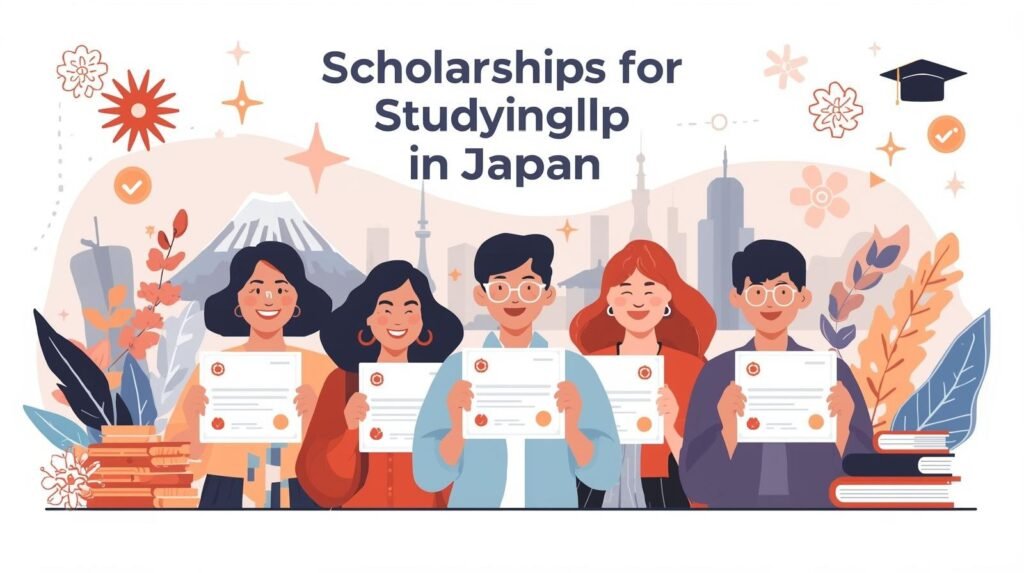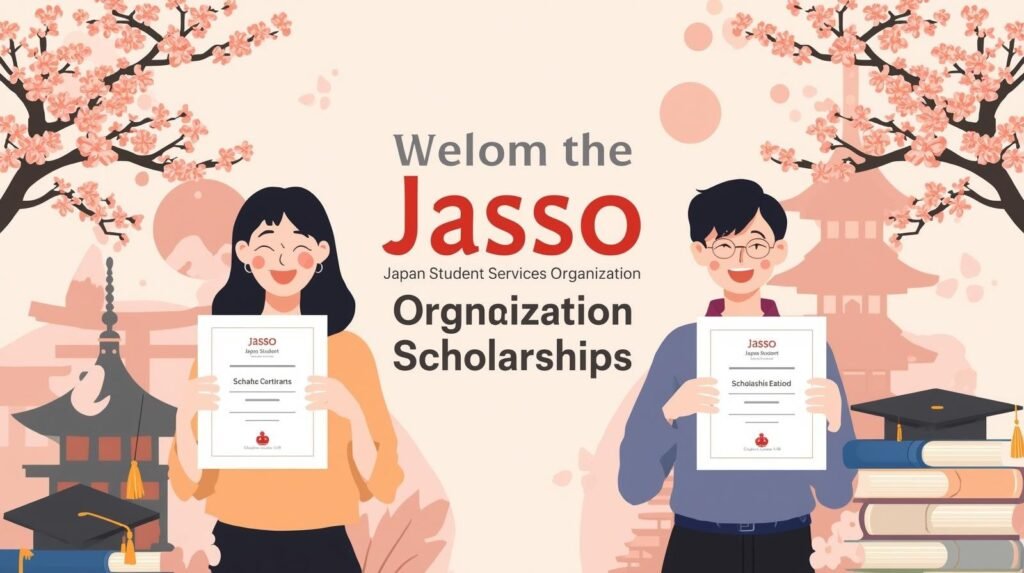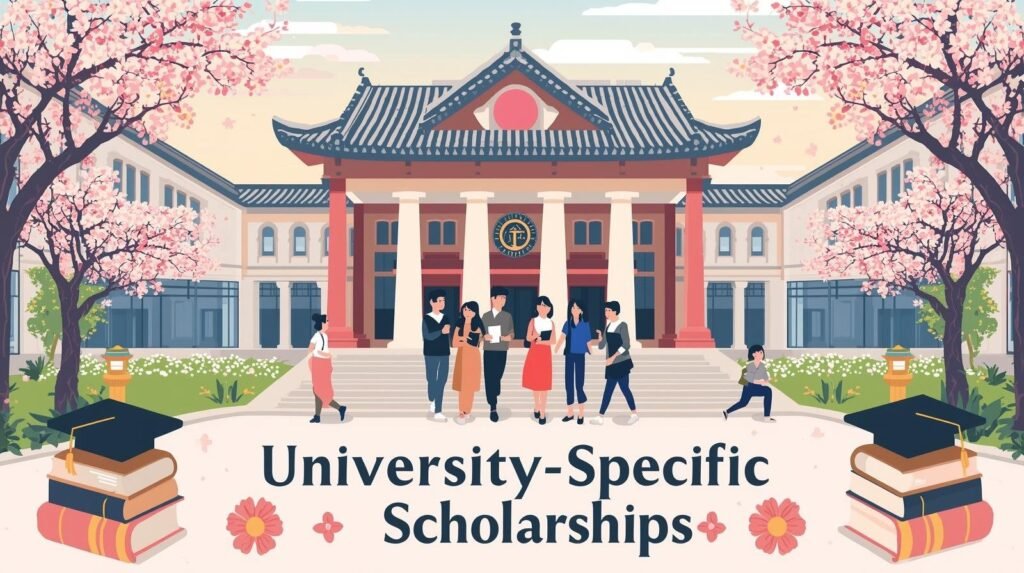Studying in Japan is a dream for many international students due to its rich culture, world-class education, and technological advancements. However, the cost of living and tuition fees can be a barrier. Fortunately, there are numerous scholarships for study in Japan available that can help ease the financial burden. Whether you are looking for a full scholarship or need financial aid for your studies, Japan offers various options for international students. In this guide, we’ll walk you through some of the most popular scholarships, how to apply, and tips on increasing your chances of winning. Official Website.
Scholarships for Studying in Japan
Japan provides a wide range of scholarships for international students, making it easier to pursue high-quality education without financial strain. Prominent programs include the MEXT Scholarship, which is fully funded by the Japanese government, JASSO Scholarships, and numerous university-specific grants offered by institutions like the University of Tokyo and Kyoto University. These scholarships often cover tuition fees, living expenses, and sometimes travel costs. By applying to these programs, international students can focus on their studies, immerse themselves in Japanese culture, and gain valuable academic and professional experiences abroad.. Read More.

1. MEXT (Monbukagakusho) Scholarship
Overview: The MEXT Scholarship is a flagship scholarship program offered by the Japanese Ministry of Education, making it one of the most prestigious and competitive scholarship programs for international students. It covers full tuition, travel expenses (airfare), and a monthly stipend to help with living expenses.
Types of MEXT Scholarships:
- Undergraduate Students: MEXT offers undergraduate scholarships for students from countries that have diplomatic relations with Japan. This covers tuition and living expenses for the duration of the program.
- Graduate Students (Master’s/Ph.D.): These scholarships are available for those pursuing graduate studies. They often require applicants to submit research proposals and academic records.
- Research Students: This category is for students wishing to engage in research at Japanese universities. Applicants need to propose their research project as part of their application.
Application Process: The process typically starts with your application being handled by the Japanese Embassy or Consulate in your country. Once selected by the embassy, you may be asked to attend an interview and sit for a written exam. After that, you’ll be informed if you’ve been accepted.
Documents Required:
- A completed application form.
- Academic transcripts and recommendation letters.
- Research proposal or study plan (particularly for graduate students).
- Proof of Japanese language proficiency (optional but beneficial).
Why It’s Worth It:
MEXT is a prestigious scholarship that offers comprehensive financial support. It’s an excellent opportunity for students who want to fully immerse themselves in Japan’s academic culture without worrying about tuition or living costs.
2. JASSO (Japan Student Services Organization) Scholarships
Overview: JASSO provides various scholarships aimed at supporting international students enrolled in universities and higher educational institutions in Japan. The two main types of JASSO scholarships are the Honors Scholarship for students with good academic standing and the Short-Term Student Scholarship for those coming to Japan for a shorter period.

Eligibility Criteria: To apply for the Honors Scholarship, you need to demonstrate strong academic performance and have been enrolled in a Japanese university for a certain period. The short-term scholarship is ideal for students participating in exchange programs or those studying for less than a year.
Application Process: Most of the application process is done through the international office of your Japanese university. Once admitted to a university, your school will help you apply for the JASSO scholarship.
Why It’s Worth It:
The JASSO scholarship is highly accessible, especially for students who are already enrolled in a Japanese university. It can provide a steady stipend to help with living costs while studying abroad.
3. Asian Development Bank (ADB)—Japan Scholarship Program
Overview: The ADB-Japan Scholarship Program is an excellent opportunity for students from developing countries to pursue graduate-level studies in Japan. It is specifically designed for those wishing to work in fields related to economic and social development.
Eligibility Criteria: Applicants must:
- Be a national of an ADB developing member country.
- Have a strong academic background and relevant professional experience.
- Be committed to contributing to their home country’s development after graduation.
Application Process: Applicants must be accepted into an eligible graduate program at a Japanese university before they can apply for the scholarship. The application involves submitting academic records, references, and an essay or study plan outlining the applicant’s career goals.
Why It’s Worth It:
This scholarship provides full coverage, including tuition, accommodation, travel expenses, and a generous monthly stipend. It’s a great opportunity for students interested in development studies or related fields.
4. University-Specific Scholarships
Many Japanese universities have their own scholarship programs specifically for international students. These programs often cater to students from particular countries or regions or to those enrolled in specific programs.

Examples of University-Specific Scholarships:
- University of Tokyo: The Special International Student Scholarship provides financial assistance to outstanding international students.
- Keio University: Offers scholarships such as the Keio University International Program Scholarship, specifically for those enrolled in international programs.
- Sophia University offers a wide variety of scholarships for undergraduate and graduate international students, which can be based on merit, financial need, or both.
Application Process: These scholarships are usually available once you are admitted or in the process of admission. It’s important to check the university’s website for specific deadlines and eligibility criteria.
Why It’s Worth It:
University-specific scholarships are tailored to the needs of the students at that institution, and many come with extra benefits like research funding, access to university resources, or part-time work opportunities.
5. Private Scholarships and External Funds
In addition to government and university scholarships, there are also various private scholarships provided by foundations, corporations, and non-governmental organizations (NGOs). These tend to be more niche in their focus, such as funding specific research fields, supporting cultural exchange, or assisting students from particular countries.
Examples:
- Rotary Peace Fellowship: Ideal for students pursuing degrees in fields like international relations, peace studies, or conflict resolution.
- The Ryoichi Sasakawa Young Leaders Fellowship Fund (SYLFF): Provides financial support to graduate students in social sciences.
- The Japan Foundation: Offers funding for students pursuing studies in Japanese culture, language, and arts.
Why It’s Worth It:
Private scholarships often come with additional opportunities, such as networking events, mentorship programs, and internship placements. They’re an excellent way to access specialized funding for certain fields of study.
How to Increase Your Chances of Winning a Scholarship
To increase your chances of winning a scholarship, start by researching thoroughly to find programs that match your profile, goals, and field of study. Prepare all required documents carefully, including transcripts, recommendation letters, and personal statements, ensuring they are clear, accurate, and compelling. Highlight your academic achievements, extracurricular activities, leadership skills, and community involvement. Tailor each application to meet the scholarship’s criteria, follow deadlines strictly, and seek guidance from mentors or university advisors. Persistence, attention to detail, and presenting a strong, authentic application significantly improve your chances of success.

- Start Early:
It’s crucial to begin the application process as early as possible. Research different scholarships, understand their requirements, and ensure all documents are prepared well in advance. - Craft a Strong Personal Statement:
Many scholarships require a personal statement or study plan. Tailor your statement to align with the values of the scholarship. Highlight your academic goals, why you’re passionate about studying in Japan, and how you plan to contribute to your field or community. - Secure Strong Letters of Recommendation:
Recommendation letters from your professors or employers should speak to your academic abilities, character, and potential. Make sure to ask for recommendations early and provide your referees with ample time to write thoughtful letters. - Show Cultural Awareness and Commitment:
Many scholarships are awarded to students who demonstrate a genuine interest in Japanese culture or who plan to contribute to international relations between Japan and their home countries. If applicable, share your passion for Japanese traditions and your plans for cross-cultural engagement. - Prepare for Interviews:
For many prestigious scholarships, the selection process involves an interview. Be ready to discuss your background, your reasons for choosing Japan, and how the scholarship will help you achieve your goals. Practice in advance to build confidence.
Frequently Asked Questions (FAQs)
1. What are the best scholarships for international students in Japan?
Japan provides numerous prestigious scholarships that help international students pursue higher education without financial strain. The MEXT (Ministry of Education, Culture, Sports, Science, and Technology) Scholarship is the most well-known, offering full tuition coverage, monthly living stipends, and sometimes travel allowances for students from around the world. JASSO Scholarships, managed by the Japan Student Services Organization, support both undergraduate and graduate students. Additionally, many top Japanese universities, such as the University of Tokyo, Keio University, Kyoto University, and Osaka University, offer their own scholarship programs for international students to attract global talent. These scholarships vary in coverage, eligibility, and duration, providing a wide range of options depending on academic goals, financial need, or research focus.
2. Can I apply for scholarships while studying in Japan?
Yes, several scholarships are open to students who are already enrolled in Japanese universities. This allows international students to apply for additional financial support once they’ve begun their studies. For instance, the JASSO Scholarship provides monthly stipends to students currently enrolled, helping cover living expenses or tuition costs. University-specific scholarships may also allow continuing students to apply based on academic performance, leadership qualities, or research potential. It’s important to check eligibility criteria, deadlines, and application procedures for each program, as requirements can vary widely. Applying while studying in Japan can help ease financial stress and provide opportunities to focus more fully on academics and campus life.
3. How do I apply for a MEXT Scholarship?
The MEXT Scholarship application can be submitted through Japanese embassies, universities, or research institutions, depending on the scholarship category. The process typically requires submitting academic transcripts, recommendation letters, personal statements, and sometimes research proposals. Applicants may also undergo interviews and written exams to evaluate academic ability, language skills, and motivation. Categories include undergraduate, graduate, research, and specialized fields such as teacher training or Japanese studies. Thorough preparation and careful adherence to guidelines are crucial, as MEXT is highly competitive. Early preparation, including gathering documents, practicing interview skills, and clarifying research goals, significantly improves the chances of success.
4. Are there scholarships for graduate studies in Japan?
Yes, graduate students have access to a variety of scholarship programs designed specifically for advanced studies. The MEXT Graduate Scholarship covers tuition fees, living expenses, and sometimes travel costs. Other programs include the ADB-Japan Scholarship Program, which targets students from Asian countries pursuing graduate degrees in development-related fields, and university-specific graduate scholarships that fund research projects or specialized programs. These scholarships provide financial stability, allowing graduate students to focus on their research, coursework, and professional development without worrying about finances. Applicants should carefully review eligibility requirements, deadlines, and necessary documentation to ensure a smooth application process.
5. Can scholarships cover both tuition fees and living expenses?
Yes, many scholarships provide comprehensive financial support. For example, the MEXT Scholarship typically covers tuition, a monthly living stipend, and sometimes travel expenses to and from Japan. JASSO Scholarships also provide monthly allowances that help cover rent, food, and other daily costs. Some university-specific scholarships may only cover tuition or partial expenses, while others offer full support for both academic and living costs. Understanding what each scholarship covers helps students plan their finances effectively and ensures they can focus on studies without financial stress.
6. Are private scholarships available for international students?
Yes, private scholarships are an important source of funding in Japan. Organizations such as the Rotary Yoneyama Memorial Foundation, corporations, foundations, and non-profit organizations provide scholarships to support international students’ education. Private scholarships may target specific countries, fields of study, or levels of education, and often have unique eligibility criteria, such as academic excellence, leadership qualities, or community involvement. These scholarships can be used alongside government or university scholarships, depending on the rules, and provide additional financial support for tuition, living costs, or travel.
7. Do I need to have a high GPA to qualify for scholarships in Japan?
Academic performance is a key factor for many scholarships, especially for prestigious programs like MEXT and top university awards. Generally, a strong GPA demonstrates your ability to succeed academically and is a critical part of the selection process. However, not all scholarships rely solely on grades. Some programs consider leadership skills, extracurricular activities, community involvement, research potential, or personal statements. This allows students with diverse strengths to be eligible. Carefully reviewing eligibility criteria for each scholarship is important to understand whether GPA, experience, or a combination of factors is most critical.
8. Can I apply for multiple scholarships at the same time?
Yes, many students apply for multiple scholarships to increase their chances of receiving financial support. However, it’s essential to check the rules of each scholarship, as some programs prohibit holding multiple awards simultaneously. When applying to multiple scholarships, make sure applications do not conflict, deadlines are met, and eligibility requirements are satisfied. Successfully combining scholarships can reduce financial burdens and provide comprehensive support covering tuition, living expenses, and travel costs, allowing students to focus fully on their studies and research in Japan.
9. How long do scholarships in Japan usually last?
The duration of scholarships varies depending on the program and level of study. Undergraduate scholarships typically last 4 years, while graduate scholarships can range from 2–3 years. Some research or short-term scholarships may cover 6 months to 1 year, depending on the scope of the project or course. Certain programs allow extensions if students meet academic performance requirements. Understanding the duration helps students plan their finances, academic workload, and research timelines effectively.
10. Where can I find scholarship application deadlines and requirements?
Official scholarship websites, Japanese embassy portals, and university international student offices are the primary sources for accurate information. Deadlines, eligibility criteria, and required documents are usually posted well in advance, so planning ahead is crucial. Early preparation allows time to gather transcripts, recommendation letters, and other supporting materials. Consulting university advisors or scholarship coordinators can provide guidance, help clarify eligibility, and ensure that applications are complete and submitted on time.
Conclusion
Studying in Japan can be expensive, but scholarships provide an excellent opportunity for international students to pursue high-quality education without financial burden. Japan offers a wide range of scholarships, including government-funded programs like the MEXT (Ministry of Education, Culture, Sports, Science, and Technology) scholarship, university-specific scholarships, and private or foundation-based funding. These scholarships often cover tuition fees, living expenses, and sometimes even travel costs.
To increase your chances of securing a scholarship, thorough research is essential. Understand the eligibility criteria, application deadlines, required documents, and evaluation process for each scholarship program. Strong academic performance, involvement in extracurricular activities, and well-written personal statements or essays can significantly enhance your application. Additionally, contacting university offices or scholarship coordinators for guidance can be helpful.
With careful preparation, determination, and persistence, you can successfully obtain a scholarship, allowing you to focus on your studies, immerse yourself in Japanese culture, and make the most of your experience as an international student in Japan.

